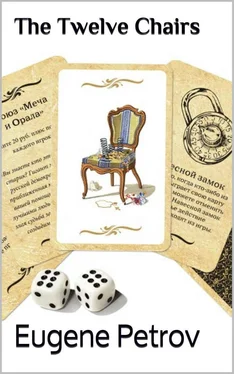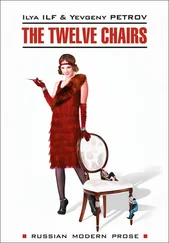Eugene Petrov - The Twelve Chairs
Здесь есть возможность читать онлайн «Eugene Petrov - The Twelve Chairs» весь текст электронной книги совершенно бесплатно (целиком полную версию без сокращений). В некоторых случаях можно слушать аудио, скачать через торрент в формате fb2 и присутствует краткое содержание. Год выпуска: 2013, Жанр: Юмористическая проза, на английском языке. Описание произведения, (предисловие) а так же отзывы посетителей доступны на портале библиотеки ЛибКат.
- Название:The Twelve Chairs
- Автор:
- Жанр:
- Год:2013
- ISBN:нет данных
- Рейтинг книги:5 / 5. Голосов: 1
-
Избранное:Добавить в избранное
- Отзывы:
-
Ваша оценка:
- 100
- 1
- 2
- 3
- 4
- 5
The Twelve Chairs: краткое содержание, описание и аннотация
Предлагаем к чтению аннотацию, описание, краткое содержание или предисловие (зависит от того, что написал сам автор книги «The Twelve Chairs»). Если вы не нашли необходимую информацию о книге — напишите в комментариях, мы постараемся отыскать её.
Find traces of a separate headset difficult and heroes face different adventures and troubles.
The Twelve Chairs — читать онлайн бесплатно полную книгу (весь текст) целиком
Ниже представлен текст книги, разбитый по страницам. Система сохранения места последней прочитанной страницы, позволяет с удобством читать онлайн бесплатно книгу «The Twelve Chairs», без необходимости каждый раз заново искать на чём Вы остановились. Поставьте закладку, и сможете в любой момент перейти на страницу, на которой закончили чтение.
Интервал:
Закладка:
The Twelve Chairs
by Ilya Ilf and Eugene Petrov
Translated from the Russian by John Richardson
Introduction
PART I:
THE LION OF STARGOROD
1 Bezenchuk and the Nymphs
2 Madame Petukhov's Demise
3 The Parable of the Sinner
4 The Muse of Travel
5 The Smooth Operator
6 A Diamond Haze
7 Traces of the Titanic
8 The Bashful Chiseller
9 Where Are Your Curls?
10 The Mechanic, the Parrot, and the Fortune-teller
11 The Mirror-of-Life Index
12 A Passionate Woman Is a Poet's Dream
13 Breathe Deeper: You're Excited!
14 The Alliance of the Sword and Ploughshare
PART II:
IN MOSCOW
15 A Sea of Chairs
16 The Brother Berthold Schwartz Hostel
17 Have Respect for Mattresses, Citizens!
18 The Furniture Museum
19 Voting the European Way
20 From Seville to Granada
21 Punishment
22 Ellochka the Cannibal
23 Absalom Vladimirovich Iznurenkov
24 The Automobile Club
25 Conversation with a Naked Engineer
26 Two Visits
27 The Marvellous Prison Basket
28 The Hen and the Pacific Rooster
29 The Author of the "Gavriliad"
30 In the Columbus Theatre
PART III:
MADAME PETUKHOV'S TREASURE
31 A Magic Night on the Volga
32 A Shady Couple
33 Expulsion from Paradise
34 The Interplanetary Chess Tournament
35 Et Alia
36 A View of the Malachite Puddle
37 The Green Cape
38 Up in the Clouds
39 The Earthquake
40 The Treasure
INTRODUCTION
It has long been my considered opinion that strains in Russo-American
relations are inevitable as long as the average American persists in
picturing the Russian as a gloomy, moody, unpredictable individual, and the
average Russian in seeing the American as childish, cheerful and, on the
whole, rather primitive. Naturally, we each resent the other side's unjust
opinions and ascribe them, respectively, to the malice of capitalist or
Communist propaganda. What is to blame for this? Our national literatures;
or, more exactly, those portions of them which are read. Since few Americans
know people of the Soviet Union from personal experience, and vice versa, we
both depend to a great extent on information gathered from the printed page.
The Russians know us-let us forget for a moment about Pravda-from the works
of Jack London, James Fenimore Cooper, Mark Twain and O. Henry. We know the
Russians-let us temporarily disregard the United Nations-as we have seen
them depicted in certain novels of Tolstoy and Dostoyevsky and in the later
dramas of Chekhov.
There are two ways to correct these misconceptions. One would be to
import into Russia a considerable number of sober, serious-minded,
Russian-speaking American tourists, in exchange for an identical number of
cheerful, logical, English-speaking Russians who would visit America. The
other, less costly form of cultural exchange would be for the Russians to
read more of Hawthorne, Melville, Faulkner and Tennessee Williams, and for
us to become better acquainted with the less solemn-though not at all less
profound-Russians. We should do well to read more of Gogol,
Saltykov-Shchedrin, Chekhov (the short stories and the one-act plays)
and-among Soviet authors-to read Mikhail Zoshchenko and Ilf and Petrov.
Thus, in its modest way, the present volume-though outwardly not very
"serious" should contribute to our better understanding of Russia and the
Russians and aid us in facing the perils of peaceful coexistence.
If writers were to be judged not by the reception accorded to them by
literary critics but by their popularity with the reading public, there
could be no doubt that the late team of Ilf and Petrov would have few peers
among Soviet men of letters. Together with another humorist, the recently
deceased Mikhail Zoshchenko, for many years they baffled and outraged Soviet
editors and delighted Soviet readers. Yet even while their works were
officially criticized in the literary journals for a variety of sins (the
chief among them being insufficient ideological militancy and, ipso facto,
inferior educational value), the available copies of earlier editions were
literally read to shreds by millions of Soviet citizens. Russian readers
loved Ilf and Petrov because these two writers provided them with a form of
catharsis rarely available to the Soviet citizen-the opportunity to laugh at
the sad and ridiculous aspects of Soviet existence.
Anyone familiar with Soviet press and literature knows one of their
most depressing features-the emphasis on the pompous and the weighty, and
the almost total absence of the light touch. The USSR has a single Russian
journal of humour and satire, Krokodil, which is seldom amusing. There is a
very funny man in the Soviet circus, Oleg Popov, but he is a clown and
seldom talks. At the present time, among the 4,801 full-time Soviet writers
there is not a single talented humorist. And yet the thirst for humour is so
great in Russia that it was recognized as a state problem by Malenkov, who,
during his short career as Prime Minister after Stalin's death, appealed to
Soviet writers to become modern Gogols and Saltykov-Shchedrins. The writers,
however, seem to have remembered only too well the risks of producing humour
and satire in a totalitarian state (irreverent laughter can easily provoke
accusations of political disloyalty, as was the case with Zoschenko in
1946), and the appeal did not bring about desired results. Hence, during the
"liberal" years of 1953-7 the Soviet Government made available, as a
concession to its humour-starved subjects, new editions of the old works of
Soviet humorists, including 200,000 copies of Ilf and Petrov's The Twelve
Chairs and The Little Golden Calf.
Muscovites and Leningraders might disagree, but there is strong
evidence to indicate that during the first decades of this century the
capital of Russian humour was Odessa, a bustling, multilingual, cosmopolitan
city on the Black Sea. In his recently published memoirs, the veteran Soviet
novelist Konstantin Paustovsky fondly recalls the sophisticated and
iconoclastic Odessa of the early post-revolutionary years. Among the famous
sons of Odessa were Isaac Babel, the writer of brilliant, sardonic short
stories; Yurii Olesha, the creator of modernistic, ironic tales; Valentin
Katayev, author of Squaring the Circle, perhaps the best comedy in the
Soviet repertory; and both members of the team of Ilf and Petrov.
Ilya Ilf (pseudonym of Fainzilberg) was born in 1897; Yevgeny Petrov
(pseudonym of Katayev, a younger brother of Valentin) in 1903. The two men
met in Moscow, where they both worked on the railwaymen's newspaper, Gudok
(Train Whistle). Their "speciality" was reading letters to the editor, which
is a traditional Soviet means for voicing grievances about bureaucracy,
injustices and shortages. Such letters would sometimes get published as
feuilletons, short humorous stories somewhat reminiscent of Chekhov's early
output. In 1927 Ilf and Petrov formed a literary partnership, publishing at
first under a variety of names, including some whimsical ones, like Fyodor
Tolstoyevsky. In their joint "autobiography" Ilf and Petrov wrote :
It is very difficult to write together. It was easier for the
Goncourts, we suppose. After all, they were brothers, while we are not even
related to each other. We are not even of the same age. And even of
Читать дальшеИнтервал:
Закладка:
Похожие книги на «The Twelve Chairs»
Представляем Вашему вниманию похожие книги на «The Twelve Chairs» списком для выбора. Мы отобрали схожую по названию и смыслу литературу в надежде предоставить читателям больше вариантов отыскать новые, интересные, ещё непрочитанные произведения.
Обсуждение, отзывы о книге «The Twelve Chairs» и просто собственные мнения читателей. Оставьте ваши комментарии, напишите, что Вы думаете о произведении, его смысле или главных героях. Укажите что конкретно понравилось, а что нет, и почему Вы так считаете.












